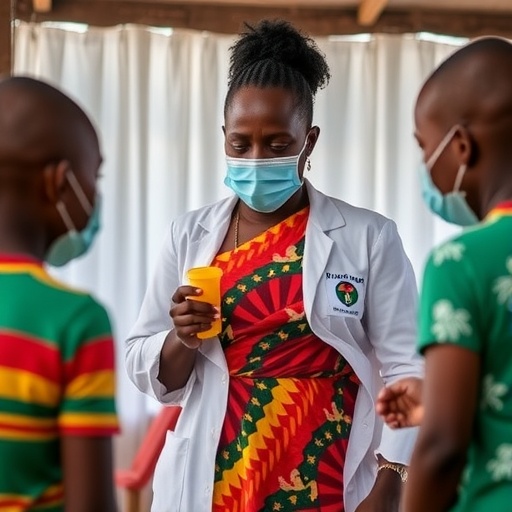The peer-reviewed study led by researchers from Kenya and Germany titled “Studies in medicine during the COVID-19 pandemic in Kenya and Germany: a cross-sectional pilot study” sheds light on the profound impact of the pandemic on medical education. This research highlights the adaptations and challenges faced by medical students and educators during an unprecedented global health crisis. The study’s findings are not only pivotal for understanding the immediate effects of the pandemic on medical training but also provide valuable insights into future educational frameworks.
In a world where traditional teaching methods were abruptly altered, the study probes into how the pandemic necessitated a shift to virtual learning environments. The research reveals detailed examinations of how both students and educators navigated this uncharted territory. This transition unveiled a variety of technological challenges, including access to reliable internet, the availability of devices, and the digital literacy required to effectively engage in online platforms. The disparities in resources have raised critical questions regarding equity in medical education, especially in developing regions like Kenya.
This cross-sectional pilot study employed a mixed-method approach, incorporating both qualitative and quantitative data. Through surveys and interviews, the researchers gathered various perspectives on the effectiveness of online learning modalities compared to traditional in-person education. The rugged terrain of online education was navigated by participants who articulated their experiences, exposing both the strengths and weaknesses of digital learning frameworks.
One of the principal findings of the study is the recognition of increased stress levels among medical students due to the demands of remote learning. Many expressed feelings of isolation and disconnect from peers and mentors, essential elements of the educational experience that were diminished during the pandemic. Notably, the research emphasizes that such emotional and psychological challenges must be addressed in future educational strategies in medical training.
Moreover, the study also explored the adaptability of educators who had to rapidly develop online curricula to ensure continuity of education. This often meant reinventing lesson plans and utilizing new technologies to maintain student engagement. The findings indicate that while many educators were initially overwhelmed, a significant portion adapted swiftly and discovered innovative methods to enhance their teaching.
One noteworthy aspect of the study is the diverse demographic of the participants. It encompasses a range of students from various backgrounds, including different educational institutions in both Kenya and Germany. This inclusivity provides a broader understanding of the global nature of the challenges posed by the pandemic in medical education, transcending geographic boundaries.
The implications of the findings extend beyond the academic realm. By examining the intersection of technology and education, the study advocates for structural changes that can better support students in times of crisis. It suggests that long-term investments into digital infrastructure could benefit not only the current cohort of medical students but future generations as well.
Another critical point raised in the research is the enhancement of self-directed learning. Students reported that they had to cultivate greater independence in their studies, leveraging online resources and developing critical thinking skills in novel ways. This shift, while challenging, may ultimately foster a more robust and adaptable future generation of medical professionals.
Looking ahead, the study calls for ongoing assessments of the educational systems in place, advocating for a flexible curriculum that can respond to various crises. It encourages institutions to embed resilience training within their programs, equipping students with the tools necessary to survive and thrive in uncertain environments.
In conclusion, the findings from this pilot study underscore a transformative period in medical education shaped by the COVID-19 pandemic. It provides a crucial lens through which to evaluate current practices and reimagine the future of training healthcare professionals. As the world moves forward, it is imperative that the lessons learned during this time are not only acknowledged but actively integrated into the foundation of medical education.
If there is anything to take away from this critical research, it is a renewed understanding that adaptation, resilience, and innovation are key to thriving in the face of adversity. Such revelations have the potential to inform educational policy and practice well into the future, ensuring that medical students are better prepared for whatever challenges may arise.
Moving forward, engagement with stakeholders from various sectors will be essential in driving the necessary reforms in medical education. By fostering dialogue and collaboration, there is immense potential to create a more equitable and effective educational environment that prepares future healthcare professionals for the complexities of modern medical practice.
Finally, as the world transitions into a post-pandemic era, this research will serve as a vital resource for understanding the evolution of medical education in response to global crises. It acts as both a mirror and a window, reflecting the needs of students and educators while offering a glimpse into the future landscape of medical training.
Subject of Research: The impact of COVID-19 on medical education in Kenya and Germany.
Article Title: Studies in medicine during the COVID-19 pandemic in Kenya and Germany: a cross-sectional pilot study.
Article References:
Omollo, A., Posingis, C., Godia, P. et al. Studies in medicine during the COVID-19 pandemic in Kenya and Germany: a cross-sectional pilot study. BMC Med Educ 25, 1528 (2025). https://doi.org/10.1186/s12909-025-08198-0
Image Credits: AI Generated
DOI:
Keywords: COVID-19, medical education, Kenya, Germany, online learning, resilience, equity, student experience, educational reform.




